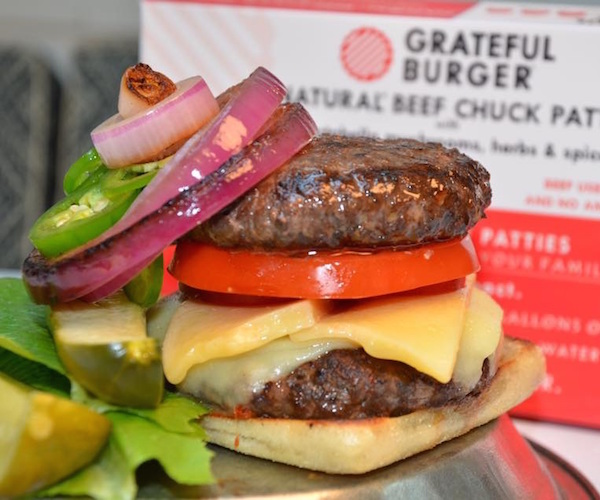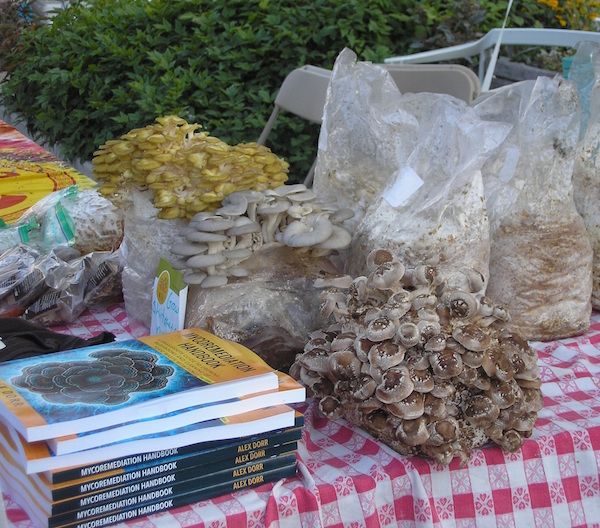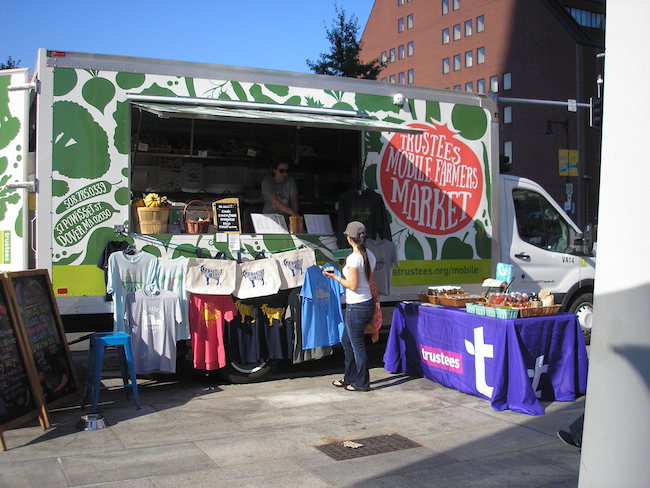Boston Local Food Festival: The Year of the Mushroom – and Sustainability
Who knew that fungi could be so inspirational?

A look at the Grateful Burger. Photo: courtesy of the company.
By Linda J. Mazurek
While mulling the focus of this article, a review of some of the coolest products I saw and/or tasted at the recent Boston Local Food Festival, I realized most of them had mushrooms in common. And all these companies are also actively contributing to sustainability and building a better food ecosystem. Who knew that fungi could be so inspirational?
Probably the coolest product I tasted was a burger by Grateful Burger, based in Beverly, MA. The bite I had was juicy and tasty, very much like a great beef burger. But I didn’t realize how cool it was until I read their literature. With taglines “Eat Great. Be Healthy.” and “Eat Great. Be Better.”, the company is introducing the industry’s first blended burger, made of fifty percent chuck and fifty percent portabellas, seasoned with herbs and spices. Founder Chris Nessen said he wanted to “recreate a beloved staple into a healthy choice and offer a sustainable alternative. By replacing beef with a low-impact ingredient, we reduced the environmental impact of an all-beef burger.” At a healthy four ounces per patty, the burgers have reduced the fats, calories, and carbohydrates of a beef burger by forty-five percent. And because they are half-vegetables, they conserve a significant amount of water; it takes 1,800 gallons of water to produce one pound of beef, but only one gallon to produce one pound of mushrooms.
Currently the burgers are only available online, but a retail presence is coming soon. Besides the basic Grateful burger, the company offers a bacon-cheddar, spicy bleu (a buffalo-style burger), and a southwest, made with corn, red peppers, jalapenos, and cilantro. The patties are sold in boxes of 12 or 24, and cost between $25.00 and $40.15. To round out the burger line, Grateful Burger also offers blended meatballs and a breakfast patty.

Fungi Ally mushroom blocks. Photo: Linda J. Mazurek.
This company should probably get in touch with another festival vendor, Fungi Ally, which sells mushroom kits, so you can grow your own. Although they don’t grow portabellas, they do offer kits for shiitake, lion’s mane, and several colors of oyster (blue, yellow, and pink) mushrooms. The Hadley, MA company’s mission is “to reveal the power of mushrooms, so more people can benefit from working with fungi. We believe in working with mushrooms to grow food, medicine, and improve ecological health.” Mushrooms are a great local food source which can be grown year-round on agricultural by-products, like straw and sawdust, thus transforming waste into life-affirming food, according to their website. The company’s mushroom spawn, as the seeds are known, are specialized to the Northeast and were selected after several trials around the region.
The lion’s mane is undoubtedly the most exotic variety they offer. Strangely shaped with a lobster-like taste, it is a delicious addition to any dish or can be sautéed in butter and lemon juice, and served as an easy side. One bag “fruits” three to five times over a two-month period, offering pounds of ‘shrooms. The other varieties produce similar results, but with slightly different fruiting periods. The seeded blocks, guaranteed to produce high yields, can be grown indoors or outside. All kits cost $20 plus shipping.
A company that makes exotic spice blends should also get in touch with Fungi Ally. Curio Spice of Cambridge, MA specializes in directly sourced, sustainably produced spices from around the world, working directly with the farmers to produce unique blends. One of these, Supeq Spice ($8.50), is a tribute to New England and made with all New England-sourced ingredients. Who knew that we grew ginger (Old Friends Farm, Amherst, MA) along with paprika and hot chili (Rehoboth, MA) in this state? I didn’t! Besides those spices, Supeq Spice includes shiitake mushrooms, dulse seaweed, and sea salt from Maine, and nettles from Vermont. “Supeq” means “ocean” in Pasamaquoddy, a New England First Nation tribe.
“I was inspired by a few factors! The first is that I was a born and raised New Englander, and wanted to create a blend that reflected my love of this region and its flavors,” explained founder Claire Cheney. “Secondly, I feel it’s crucial to support local farms – it’s part of our mission – and it’s not often that one thinks of doing so through the spices we season our meals with. Even salt is a product we’ve grown accustomed to being from ‘far away.’ In creating Supeq Spice, I worked hard to create a unique blend that expressed the flavors of New England.”
This spice would be perfect sprinkled over popcorn, which is how it was offered for sampling at the company’s table, so Popzup’s founders, Marty and Julie Lapham, should probably connect with Claire! The Dover, NH-based company is committed to providing safe, chemical-free, non-GMO, and locally sourced popcorn products. It also makes a reusable microwave box, to cut down on waste. “In 2009, the red microwave popcorn popper we received as a gift turned our popcorn red. Horrified, we researched and found that conventional microwave popcorn bags were toxic,” said Julie. “We made it our mission to clean up this problem. It took over five years to invent the patented Popzup Popper ̶ a new way to microwave popcorn without chemicals, plastic, or silicone.”
Their revolutionary Popzup Popper ($15.00) microwaves popcorn cleanly, unlike other packaged microwave popcorn, and can be used 12 times, making it more cost-effective than other products on the market. It comes with 12 single-batch pouches of popcorn, totaling 2 pounds. The box’s top expands as the popcorn pops.

The Trustees Mobile Market. Photo: Linda J. Mazurek.
Popzup also makes eight pure seasoning blends, with no fillers or flavor enhancers, including New England-themed flavors, like Maple Alder-Smoked and Vermont Maple. Cheesy Taco, Buttermilk Ranch, Sweet Sriracha Chili, Guiltless Kettle Corn, and Everything Bagel, all $6.25, are also available, while the Solar-Dried Sea Salt ($5.50) is a sustainable option. Popzup’s popcorn and line of seasonings will be on sale at Whole Foods (September 27 – October 31) and Roche Brothers (September 15 – October 26).
Some of the other cool products I saw were mushroom (again!) herbal teas from Tamim Teas in Arlington, MA; a line of syrups and jams from wild or organically grown edibles (spruce syrup, dandelion and sunflower jams) from Edible Wilds in Millinocket, ME; Welsh cakes, a scone-pancake-biscuit hydrid made by Copper Kettle Bakery in Westwood, MA; frozen cranberry blends from Cape Cod Select in Carver, MA; cold-brewed coffee elixirs by MOJO Cold Brewed Coffee in Wenham, MA: sustainably farmed Nicaraguan coffee by Recreo Coffee & Roasterie in West Roxbury, MA; and carbonated drinks made with honey and fresh-pressed juices from Green Bee in Brunswick, ME.
Among the companies and associations devoted to improving our food system were Boston Area Gleaners, Boston Organics, Community Servings, DoneGood, Farmer Dave’s, Food Solutions, Green Restaurant Association, Localvore.co, New Entry Sustainable Farming Project, Northwest Atlantic Marine Alliance, Seaview Farm, Seeding the Future, The Trustees, WhatsGood, and World Farmers. This was the seventh year of the festival, and, in my opinion, the largest and best one yet! Organized by the Sustainable Business Network of Massachusetts, it was easy to connect with food friends, old and new, and to network with local organizations involved in food. Thanks, SBN, for offering a great day of nourishment and refreshment for body and soul.
Linda J. Mazurek is an award-winning communications professional, with more than 25 years of writing and editing experience. Blending this with her passion for food, she has written more than 90 articles since late 2006, published both online and in print, including nine in The Boston Globe’s food section.
Tagged: Boston Area Gleaners, Boston Local Food Festival, Boston Organics, Community Servings, Curio Spice, DoneGood, Farmer Dave’s, Food Solutions, Fungi Ally, Grateful Burger, Green Restaurant Association, Linda J. Mazurek, Localvore.co, New Entry Sustainable Farming Project, Northwest Atlantic Marine Alliance, Popzup, Seaview Farm, Seeding the Future, Sustainable Business Network of Massachusetts, The Trustees, WhatsGood
